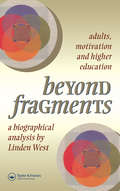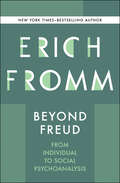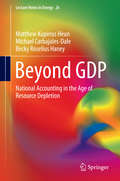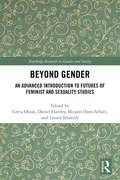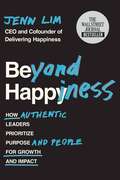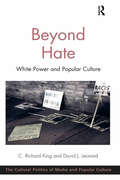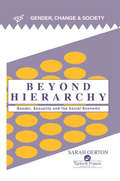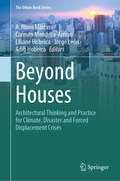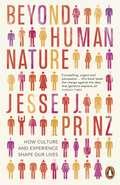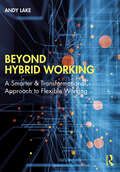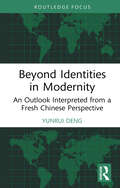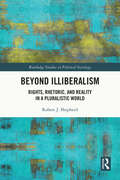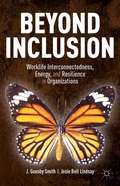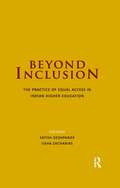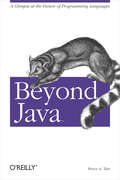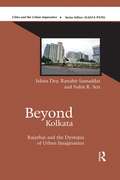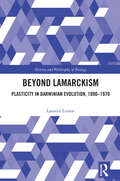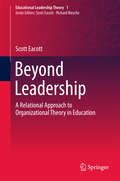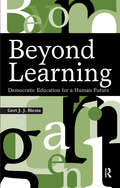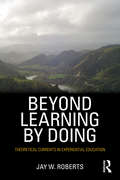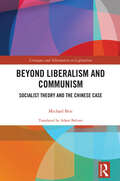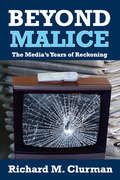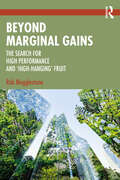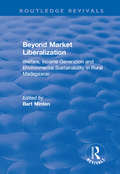- Table View
- List View
Beyond Expectation: Lesbian/Bi/Queer Women and Assisted Conception
by Jacquelyne LuceAn in-depth study of lesbian, bi, and queer women's experiences of thinking about and trying to become a parent, Beyond Expectation draws on eighty-two narrative interviews conducted during the late 1990s in British Columbia. Jacquelyne Luce chronicles these women's experiences, which took place from 1980 to 2000, during a period that saw significant changes to the governance of assisted reproduction and the status of lesbian, gay, bisexual, and transgender parents and same-sex partners.Beyond Expectation looks closely at the changing contexts in which women's experiences occurred and draws attention to complex issues such as 'contracting' relationships, mediating understandings of biology and genetics, and decision-making amidst various social, legal, and medical developments. Luce skillfully juxtaposes the stories of her interviewees with the wider public discourses about lesbian/bi/queer parenting and reproductive technology and highlights gaps in existing legislative reforms. Most importantly, Beyond Expectation foregrounds the lived experiences of lesbian, bi, and queer women as they negotiate kinship at the intersection of reproduction, technology, and politics.
Beyond Fragments: Adults, Motivation And Higher Education
by Linden WestAdults now constitute the majority of students in higher education; what they bring to it, want and need are important questions in the development of a more responsive higher education. The author discusses The Relationship Between Motives, Education, And Life History To Explore how culture and history shape people and their motives for learning, taking into account variations in gender, social background and ethnicity, challenging the orthodox view that non-traditional students enter higher educational for vocational/material reasons.
Beyond Freud: From Individual to Social Psychoanalysis
by Erich FrommThe acclaimed social psychologist and New York Times–bestselling author of The Art of Loving examines what drives human beings. At the beginning of the twentieth century, Sigmund Freud was the first scientist to attempt to present the reality of the individual human being&’s unconscious and to find ways of dealing with unconscious forces. In the early 1930s, Erich Fromm built upon Freud&’s insights on the individual and began to study the unconscious of society. However, this attempt soon revealed the limits of the theory of drives, which Freud used to bring his discoveries into a systematic explanatory context. In Beyond Freud, Fromm discusses his findings in relation to Freud&’s. In studying both the unconsciousness of the individual and of society, Fromm found that Freud wrongly based psychology totally on natural factors; Freud needed to include social influences as well. This book is broken into three dynamic sections: 1. Man&’s Impulse Structure and Its Relation to Culture 2. Psychic Needs and Society (1956 lecture) 3. Dealing with the Unconscious in Psychotherapeutic Practice (1959 lecture)Beyond Freud explores the understanding of psychoanalytic theory, relating Freudian observations and practices to the needs of society; handling the unconscious in psychotherapeutic practice; and considering the relevance of Freud&’s discoveries for therapy today.
Beyond GDP: National Accounting in the Age of Resource Depletion (Lecture Notes in Energy #26)
by Matthew Kuperus Heun Michael Carbajales-Dale Becky Roselius HaneyThis book uses the metaphor "The economy is society's metabolism" as a springboard to develop a rigorous theoretical framework for a better system of national accounts which goes "Beyond GDP" and is relevant to the age of resource depletion. Society is entering a new era in which biophysical limits related to natural resource extraction rates and the biosphere's waste assimilation capacity are becoming binding constraints on mature economies. Unfortunately, the data needed for policy-makers to understand and manage economic growth in this new era are not universally available. All stakeholders need a new way to understand our economy in the context of the biosphere's ability to provide essential natural capital, and we suggest that detailed information about materials, energy, embodied energy, and energy intensity should be routinely gathered, analyzed, and disseminated from a centralized location to provide markets and policymakers with a more comprehensive understanding of the biophysical economy. However, a firm theoretical foundation is needed before proceeding along this new path, which this book is intended to provide. After arguing that the stock of manufactured capital is an important driver of material and energy demands imposed upon the biosphere, a new accounting framework is derived from the laws of thermodynamics to reflect the fact that material and embodied energy accumulate within the capital stock of economic sectors. This framework extends the Energy Input-Output (EI-O) techniques first developed by Bullard, Herendeen, and others to estimate energy intensity of economic products. Implications from the new framework are discussed, including the value of economic metrics for policy-making, the need for physically-based rather than product-based EI-O formulations, a re-assessment of the concept of economic "growth," and an evaluation of recycling, reuse, and dematerialization. The framework also provides an opportunity to assess an array of definitions for Daly's "steady-state economy" in relation to the ideal of a sustainable economy. The book ends with a list of steps to be taken in creating a more comprehensive system of national accounts: National accounting agencies worldwide should develop and maintain balance sheets of both natural and manufactured capital in addition to national income statements All stocks and inter-sector flows should be provided in physical as well as financial units In the US, the Bureau for Economic Analysis (BEA) should restart detailed Capital, Labor, Energy, Material, and Services (KLEMS) reporting National accounting agencies should routinely estimate the energy intensity of economic products, and all of the above should be estimated and disseminated on an annual basis.
Beyond Gender: An Advanced Introduction to Futures of Feminist and Sexuality Studies (Routledge Research in Gender and Society)
by Daniel Hartley Greta Olson Mirjam Horn-Schott Regina Leonie SchmidtScholars and activists often narrate the history of gender and feminism as a progression of "waves," said to mark high points of innovation in theory and moments of political breakthrough. Arguing for the notion of multiple futurities over that of progressive waves, Beyond Gender combines theoretical work with practical applications to provide an advanced introduction to contemporary feminist and sexuality research and advocacy. This comprehensive monograph documents the diversification of gender-related disciplines and struggles, arguing for a multidisciplinary approach to issues formerly subsumed under the unified field of gender studies. Split into two parts, the volume demonstrates how the notion of gender has been criticized by various theories pertaining to masculinity, feminism, and sexuality, and also illustrates how the binary and hierarchical ordering system of gender has been troubled or overcome in practice: in queer performance, legal critique, the classroom, and textual analysis. Taking a fresh approach to contemporary debates in feminist and sexuality studies, Beyond Gender will appeal to undergraduate students interested in fields such as Feminism and Sexuality Studies, Gender Studies, Feminist Theory, and Masculinity Studies.
Beyond Happiness: How Authentic Leaders Prioritize Purpose and People for Growth and Impact
by Jenn LimThe co-founder and CEO of Delivering Happiness updates the Delivering Happiness model for our new abnormal, showing organizations of every kind how to cultivate a culture that can adapt to change, be highly profitable, and support all its people...starting with yourself. Jenn Lim has dedicated her career to helping organizations from name-brand industry leaders to innovative governments build workplace cultures that benefit both their employees and their bottom line, with less employee turnover, greater engagement, and higher profits. Her culture consultancy, Delivering Happiness, demonstrates the profound impact happiness can have on businesses' ability to thrive in our ever-changing times. In this book, she clearly and concretely shows the way the model works in a hyper-connected fast-paced world, beginning with each individual defining their sense of values and purpose (the ME), and rippling through the organization ecosystem (the WE and the COMMUNITY) in waves of impact. Drawing on a deep understanding of the science of happiness, Jenn shows how bringing your whole self to work allows you to do your best work every day -- no matter what role you play at your company or what crisis might come at you next. She explains how true happiness comes from living your true purpose, and offers case studies to show how companies can help individuals align their purpose with the company mission. This innovation in organizational design and company culture is no longer a nice-to-have. It&’s the future of work, and it&’s here now. In this life-changing guide, you'll be empowered to find greater purpose in your own life and career, and to spread that power to others in your business and beyond.
Beyond Hate: White Power and Popular Culture (The Cultural Politics of Media and Popular Culture)
by C. Richard King David J. LeonardBeyond Hate offers a critical ethnography of the virtual communities established and discursive networks activated through the online engagements of white separatists, white nationalists, and white supremacists with various popular cultural texts, including movies, music, television, sport, video games, and kitsch. Outlining the ways in which advocates of white power interpret popular cultural forms, and probing the emergent spaces of white power popular culture, it examines the paradoxical relationship that advocates of white supremacy have with popular culture, as they finding it to be an irresistible and repugnant reflection of social decay rooted in multiculturalism. Drawing on a range of new media sources, including websites, chat rooms, blogs and forums, this book explores the concerns expressed by advocates of white power, with regard to racial hierarchy and social order, the crisis of traditional American values, the perpetuation of liberal, feminist, elitist ideas, the degradation of the family and the fetishization of black men. What emerges is an understanding of the instruments of power in white supremacist discourses, in which a series of connections are drawn between popular culture, multiculturalism, sexual politics and state functions, all of which are seen to be working against white men. A richly illustrated study of the intersections of white power and popular culture in the contemporary U.S., and the use of use cyberspace by white supremacists as an imagined site of resistance, Beyond Hate will appeal to scholars of sociology and cultural studies with interests in race and ethnicity, popular culture and the discourses of the extreme right.
Beyond Hierarchy: Gender And Sexuality In The Social Economy (Gender, Change And Society Ser.)
by Sarah Oerton University of Wales.Since the early 1980s there has been a surge of interest in both issues of gender and sexuality in work and organizational life, and in the founding and running of co-operatives and collectives. Since hierarchy rests on divisions which are in part gendered and sexualized, and co-operatives for the most part operate with "flat" or non-hierarchical structures, they could be seen as places where gender and sexuality make little difference to the experiences of workers.; This text takes issue with the assumption that where there is an absence of formal hierarchy in work and organizational life, there is likely to be an absence of gender inequalities. It argues that the matter is more complex than the simple equating of less hierarchy with greater gender equality.
Beyond Houses: Architectural Thinking and Practice for Climate, Disaster and Forced Displacement Crises (The Urban Book Series)
by A. Nuno Martins Carmen Mendoza-Arroyo Liliane Hobeica Jorge León Adib HobeicaThis book delves into the complexities of urban crises, focusing on the efforts of researchers and practitioners who confront precarious housing and forced displacement. Originating from the 8th International Conference on Building Resilience (convened in November 2018 in Lisbon, Portugal), this book examines challenges across diverse contexts and geographies, including Chile, India, Kenya, Mexico, Portugal, and Syria. Structured in three parts, the book's 12 chapters address disaster prevention and recovery, humanitarian architecture, and issues related to housing, migration, and urban forced displacement. The narratives emphasize vulnerabilities, community-driven design, and cross-cultural perspectives, comprehensively reviewing global urban planning, slum upgrading, and incremental housing strategies. The contributions engage readers with practical insights for mitigating urban vulnerability and intellectual analyses that consider the complexities of life amid systemic injustices. Ultimately, the authors suggest integrating architectural practice with social work within communities to address intricate urban housing challenges.
Beyond Human Nature: How Culture and Experience Shape Our Lives
by Jesse J PrinzIn this provocative, revelatory tour de force, Jesse Prinz reveals how the cultures we live in - not biology - determine how we think and feel. He examines all aspects of our behaviour, looking at everything from our intellects and emotions, to love and sex, morality and even madness. This book seeks to go beyond traditional debates of nature and nurture. He is not interested in finding universal laws but, rather, in understanding, explaining and celebrating our differences. Why do people raised in Western countries tend to see the trees before the forest, while people from East Asia see the forest before the trees? Why, in South East Asia, is there a common form of mental illness, unheard of in the West, in which people go into a trancelike state after being startled? Compared to Northerners, why are people in the American South more than twice as likely to kill someone over an argument? And, above all, just how malleable are we?Prinz shows that the vast diversity of our behaviour is not engrained. He picks up where biological explanations leave off. He tells us the human story.
Beyond Hybrid Working: A Smarter & Transformational Approach to Flexible Working
by Andy LakeMuch more than a book about flexible working, Beyond Hybrid Working is an engaging and practical management book to help organisations rethink all aspects of traditional work in the emerging post-pandemic landscape and reap the benefits from working smarter. Many organisations that had rapidly improvised and implemented Hybrid Working now want to take a more strategic approach. ‘Smart Working’ is being adopted across sectors, from technology companies, through the financial services sector to the public sector. Andy Lake has supported implementations in businesses and public sector organisations for nearly 30 years, including advising the UK Cabinet Office. He sets out a strategic, comprehensive and integrated approach to Smart Working in the context of new possibilities for working on a more distributed basis, and the impact of new AI-based technologies coming over the horizon. He also explores the possibilities for greater flexibility for workers with hands-on and site-specific roles. Featuring detailed case studies, the book takes a pragmatic and evidence-based approach covering different sectors and types of work, and presents practical techniques for implementing change. This is essential reading for anyone involved in transformational workplace change and increasing the efficiency of organisations. It is written for managers who need to deliver change, and professionals and researchers in the fields of People, Workplace and Technology.
Beyond Identities in Modernity: An Outlook Interpreted from a Fresh Chinese Perspective
by Yunrui DengThis book argues that future generations of modernity as a whole will shape participatory modernization whether Chinese modernization or Western modernization. The public discourse is inundated with the good and the bad modern events with the acceleration of globalization.This book debates that the biggest question in the twenty-first century is not who will dominate, touting a new world order upon us, but rather that it is the orientation of modernization that haunts our daily realities. This book explores the idea that life is not about living for an identity in any society, it is about the demands for dignity and safety. It goes further to state that there is also a demand for the power of being, and these three elements are beyond identities as modernization moves forward. Interdisciplinary in nature, the book uses theories, data, and philosophy as toolboxes to align with microrealities around the globe. Witnessing modernization and modernizing identities in China and in Australia beyond day by day, the author provides a more suitable, more realistic, and possibly, more nuanced perspective.This book will be of interest to professionals, students, academics, as well as businesspeople with China experience, interested in modernization and identity, the Chinese perspective, and the new generation of Chinese.
Beyond Illiberalism: Rights, Rhetoric, and Reality in a Pluralistic World (Routledge Studies in Political Sociology)
by Robert ShepherdArguing that there has never been a consensus on which rights all people are entitled, Beyond Illiberalism: Rights, Rhetoric, and Reality in a Pluralistic World traces how the concept of human rights is tied to a global project rooted in colonialism and grounded in nineteenth-century liberalism and post-World War II social democratic principles.This book contends that human rights are conceived, imagined, and promoted by dominant states, organizations, and activists within a specific liberal framework, and that, after more than 200 years, the dream of a universal history rooted in the worldview of G.W.F. Hegel has been displaced by the stuff of practical reality.Robert J. Shepherd shifts our attention to rights as a matter of human practice and emphasizes the importance of the actualization of rights within local contexts, demonstrating the spuriousness of categorizing governments as "liberal" or "illiberal" based on preconceived notions of what counts as legitimate rights. This book will appeal to scholars of anthropology, sociology, socio-legal studies, and cultural studies.
Beyond Inclusion
by J. Goosby Smith Josie Bell LindsayAfter infusing equity into organizational processes, conducting diversity training, and ensuring fair hiring practices, today's leaders have hit a brick wall. While they have diversified organizations, they realize that more needs to be done to make their organizations truly inclusive. Beyond Inclusion adopts a holistic and systems view of the organization and presents a robust model of how individuals and leaders experience inclusion in the workplace. Borrowing the African concept of Ubuntu, which assumes the connectedness and interdependence within a social system, the authors frame and make concrete the thoughts and actions that result in inclusive organizations. After presenting an actionable model of organizational inclusion based upon rigorous research with thousands of individual contributors and leaders in several countries including the U. S. , the authors discuss concrete strategies and leadership actions that create, nurture, and sustain workplace inclusion. Leaders will learn specific behaviors that energize themselves and their employees, resulting in more inclusive teams, departments, and organizational cultures.
Beyond Inclusion: The Practice of Equal Access in Indian Higher Education
by Satish Deshpande Usha ZachariasIn India, two critical aspects of public policy — social justice and higher education — have witnessed unprecedented expansion in recent years. While several programmes have been designed by the State to equalise access to higher education and implement formal inclusion, discrimination based on caste, tribe, gender, and rural location continues to exist. Focusing on the concrete experiences of these programmes, this book explores the difficulties and dilemmas that follow formal inclusion, and seeks to redress the disproportionate emphasis on principles rather than practice in the quest for equal access to higher education in India. Offering new perspectives on the debates on social mobility and merit, this volume examines a broad spectrum of educational courses, ranging from engineering, medicine and sciences to social work, humanities and the social sciences that cover all levels of higher education from undergraduate degrees to post-doctoral research. It points to various sources of social exclusion by studying a cross-section of national, elite, subaltern, and sub-regional institutions across the states of Rajasthan, Gujarat, Jharkhand, Uttar Pradesh, Punjab, Kerala, and Tamil Nadu. Closely involved with the implementation and evaluation of affirmative action programmes, the contributors to the volume highlight the paradoxical ‘sectionalisation’ of reserved candidates, the daunting challenge of combating discrimination. Understanding the need to look beyond formal inclusion to enable substantive change, this important volume will be essential reading for scholars and teachers of sociology, education, social work, economics, public administration, and political science, besides being of great interest to policymakers and organisations concerned with education and discrimination.
Beyond Java
by Bruce A. TateBruce Tate, author of the Jolt Award-winning Better, Faster, Lighter Java has an intriguing notion about the future of Java, and it's causing some agitation among Java developers. Bruce believes Java is abandoning its base, and conditions are ripe for an alternative to emerge. In Beyond Java, Bruce chronicles the rise of the most successful language of all time, and then lays out, in painstaking detail, the compromises the founders had to make to establish success. Then, he describes the characteristics of likely successors to Java. He builds to a rapid and heady climax, presenting alternative languages and frameworks with productivity and innovation unmatched in Java. He closes with an evaluation of the most popular and important programming languages, and their future role in a world beyond Java. If you are agree with the book's premise--that Java's reign is coming to an end--then this book will help you start to build your skills accordingly. You can download some of the frameworks discussed and learn a few new languages. This book will teach you what a new language needs to succeed, so when things do change, you'll be more prepared. And even if you think Java is here to stay, you can use the best techniques from frameworks introduced in this book to improve what you're doing in Java today.
Beyond Kolkata: Rajarhat and the Dystopia of Urban Imagination (Cities and the Urban Imperative)
by Ranabir Samaddar Ishita Dey Suhit K. SenThis book examines the politics behind, and the socio-economic and ecological repercussions of, the making of a new township, variously called New Town, Megacity or Jyoti Basu Nagar, in Rajarhat near Kolkata. Conceived by the West Bengal state government in the mid-1990s, in pandering to the vision of urban planners of creating a hi-tech town beyond an unruly, crowded Kolkata, and feeding the hunger of realtors and developers, the city is built on the foundations of coercive, even violent, land acquisition, state largesse and corruption — and at the cost of erasing a self-sufficient subsistence economy and despoiling a fragile environment. Yet, after its completion and departure of construction labour, the new town appears as a necropolis, a ghost city, that belies its promised image of an urban utopia, even as the displaced locals lead a precarious, mobile existence as ‘transit labour’, engaged in odd and informal jobs. Written on the basis of intensive fieldwork, government documents, court records, and chronicles of public protests, this book broadly analyses the politics and economics of urbanisation in the age of post-colonial capitalism, particularly the paradoxical combination of neoliberal and primitive modes of capital accumulation upon which the global emergence of ‘new towns’ is based. Departing from the dominant styles of urban studies that focus on cultural or spatial analysis of cities, the authors show the links between changes in space, technology, political economy, class composition, and forms of urban politics which give concrete shape to a city. It will immensely interest those in sociology, political science, economics, development studies, urban studies, policy and governance studies, and history.
Beyond Lamarckism: Plasticity in Darwinian Evolution, 1890-1970 (History and Philosophy of Biology)
by Laurent LoisonOver the past 20 years, the role of phenotypic plasticity in Darwinian evolution has become a hotly debated topic among biologists and philosophers of science. For instance, in the Extended Evolutionary Synthesis, a new form of evolutionary theory that aims to include processes not taken into account by standard theory (the Modern Synthesis), the question of the remarkable plasticity of living beings is central.Beyond Lamarckism: Plasticity in Darwinian Evolution, 1890–1970 shows that the evolutionary impact of plasticity was in fact debated long before the emergence of the current debate on the limits of the Modern Synthesis. The question of how the plasticity of organisms could play a causal role in Darwinian evolution was raised on two separate occasions: first, around 1900, with the emergence of the theory of “organic selection” and, second, during the formation of the Modern Synthesis itself, in the mid-20th century. Out of these reflections came a very large number of concepts, models, and many different terms (“organic selection”, “stabilizing selection”, “genetic assimilation”, “Baldwin effect”, etc.), which were often developed independently in various research traditions and empirical contexts. This book also looks at the reasons why these conceptions have been downplayed in the standard understanding of adaptive evolution.Showing the extraordinary complexity of this history, Beyond Lamarckism is aimed at readers interested in evolutionary theory, whether philosophers, biologists, or historians.
Beyond Leadership: A Relational Approach to Organizational Theory in Education (Educational Leadership Theory)
by Scott EacottThis book systematically elaborates Scott Eacott’s “relational” approach to organizational theory in education. Contributing to the relational trend in the social sciences, it first surveys relational scholarship across disciplines before providing a nuanced articulation of the relational research program and key concepts such as organizing activity, auctors, and spatio-temporal conditions. It also includes critical commentaries on the program from key figures such as Tony Bush, Megan Crawford, Fenwick English, Helen Gunter, Izhar Oplatka, Augusto Riveros, and Dawn Wallin. As such, the text models an approach to, or social epistemology for building knowledge claims in relation rather than through parallel monologues.Eacott’s relational approach provides a distinctive, post-Bourdieusian variant of the relational sociological project. Shifting the focus of inquiry from entities (e.g., leaders, organizations) to organizing activity and recognizing how auctors generate – simultaneously emerging from and constitutive of – spatio-temporal conditions unsettles the orthodoxy of organizational theory in educational administration and leadership. By presenting its claims in the context of other approaches, the book stimulates intellectual debate among both relational sociologists and opponents of relational approaches. Beyond Leadership provides significant insights into the organizing of education. As it does not fit neatly into any one field, but instead blends educational administration and leadership, organizational studies, and relational sociology, among others, it charts new territory and promotes important dialogue and debate.
Beyond Learning
by Gert J. BiestaMany educational practices are based upon ideas about what it means to be human. Thus education is conceived as the production of particular subjectivities and identities such as the rational person, the autonomous individual, or the democratic citizen. Beyond Learning asks what might happen to the ways in which we educate if we treat the question as to what it means to be human as a radically open question; a question that can only be answered by engaging in education rather than as a question that needs to be answered before we can educate. The book provides a different way to understand and approach education, one that focuses on the ways in which human beings come into the world as unique individuals through responsible responses to what and who is other and different. Beyond Learning raises important questions about pedagogy, community and educational responsibility, and helps educators of children and adults alike to understand what a commitment to a truly democratic education entails.
Beyond Learning by Doing: Theoretical Currents in Experiential Education
by Jay W. RobertsWhat is experiential education? What are its theoretical roots? Where does this approach come from? Offering a fresh and distinctive take, this book is about going beyond "learning by doing" through an exploration of its underlying theoretical currents. As an increasingly popular pedagogical approach, experiential education encompasses a variety of curriculum projects from outdoor and environmental education to service learning and place-based education. While each of these sub-fields has its own history and particular approach, they draw from the same progressive intellectual taproot. Each, in its own way, evokes the power of "learning by doing" and "direct experience" in the educational process. By unpacking the assumed homogeneity in these terms to reveal the underlying diversity of perspectives inherent in their usage, this book allows readers to see how the approaches connect to larger conversations and histories in education and social theory, placing experiential education in social and historical context.
Beyond Liberalism and Communism: Socialist Theory and the Chinese Case (ISSN)
by Michael BrieBeyond Liberalism and Communism: Socialist Theory and the Chinese Case presents a new conceptual framework of socialism and applies it to the study of socialist development in China, shedding new light on modern China and signposting novel directions in socialist thought.Based on a Marxian-Polanyian approach, the book develops a new conceptual framework of socialism by taking the liberal and the communist challenges seriously. In doing so, Brie develops a liberal and a communist formula of socialism based upon two owners of socialist property (the individuals and the society), different forms of possession (public, common, associative, and individual) meditating the interests of the two opposite owners, and democracy as an expression of the will of the many and of all together in common. This formula is then applied to socialist development in China, analysing its booming centrally directed economy and the political ways to safeguard democracy as the rule of, for, and by the people under the Chinese Communist Party.With an analysis of the means by which China has pursued a unique form of socialist development, Beyond Liberalism and Communism: Socialist Theory and the Chinese Case will appeal to scholars of modern China, political theory, political sociology, and socialist thought.
Beyond Malice: The Media's Years of Reckoning
by Richard M. ClurmanThe national news media, as now practiced, were born in the 1950s, revealed their strength in the 1960s (Vietnam), asserted it in the 1970s (Watergate), and were hammered for it in the 1980s. By the mid- and late 1980s, after historic libel suits, with the press knocking off presidential candidates and Supreme Court nominees, unraveling the Reagan presidency, and in a position to overwhelm any individual or institution, a new era in press-public tension had arisen from the depths of America's civic religion: fair play.In this account of the media mandarins' rise to uneasy domination, Richard M. Clurman gives an intimate critical report of the media in the 1980s, the stormiest years in press history until the present time, and a harbinger of the present day. Beginning with the invasion of Grenada, he takes his readers - event by event - through the biggest uproars in history, raising questions from both the media's and the public's perspective on the key troubling press issues of our time. Why is the press accused of being so negative, so biased, so left-wing, so anti-establishment? Whenever people read or see something they know about, why is it so often wrong, naive, unfair, or all of the above? Why do the media arrogantly try to tell people what to think? Is there no line between privacy and the people's "right to know"? How can the public and government answer back after the media have spoken?Using the Westmoreland v. CBS and the Sharon v. Time trials as emblematic of how things go wrong, the author draws graphic lessons for improved press conduct and wiser public perception. This is an insider's look at what is right and what is wrong with the media's attitudes toward their work played against public and government expectations.
Beyond Marginal Gains: The Search for High Performance and ‘High-Hanging’ Fruit
by Rob MugglestoneShowcasing the Optimal, Maximal, Incremental, and Threshold (OMIT) and Accelerate The Curve (ATC) models, this book offers a solid understanding of high performance and how to improve it.The concept of marginal gains is well known – make small improvements and increase performance. What happens when these gains are harder to find? This book answers all your performance-related questions including: How can I continue to improve, even if I am better than I have ever been, and better than everyone else? How can I use my time, energy and resources better, so that I can improve more, with less? The book begins by introducing two concepts for high performance – OMIT and ATC. Using high-profile case studies, it maps the performance of business and sporting organisations, as well as individuals, against these models and offers practical advice for those looking to understand and improve their own performance using these concepts. Beyond marginal gains, towards threshold gains.Combining the theoretical understanding of each model with suggestions for how to apply them in practice, this is the ideal resource for those looking to increase individual, team, or organisational performance across a range of domains.
Beyond Market Liberalization: Welfare, Income Generation and Environmental Sustainability in Rural Madagascar
by Bart MintenThis title was first published in 2000: Most African countries experienced dramatic agricultural market reforms over the 1990s. This has resulted in significant changes in the operation of the agricultural markets and, consequently, in income generation and welfare of rural households. In the case of Madagascar, the results suggest that market reforms and corresponding adjustments in rural markets have had an average positive effect on food security for the rural households. However, richer households seemed to have benefited more than the poorer households. This text provides a study of the market reforms, focusing particularly in the changes brought to welfare, income and environmental sustainability in rural areas. The study aims to be of particular interest to economists and those involved in development and environmental issues.

